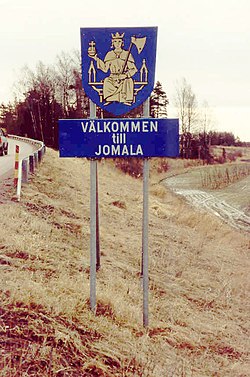Jomala is a municipality of Åland, an autonomous territory of Finland. In terms of population, it is the next largest after Mariehamn, the capital of Åland.
Jomala | |
|---|---|
Municipality | |
| Jomala kommun | |
 "Welcome to Jomala." The coat of arms of Jomala features St. Olav sitting on a throne and holding an axe and a globus cruciger | |
 Location of Jomala in Finland | |
| Coordinates: 60°09′N 019°57′E / 60.150°N 19.950°E | |
| Country | |
| Region | Åland |
| Sub-region | Åland Countryside sub-region |
| Government | |
| • Municipal manager | Christian Dreyer |
| Area (2018-01-01)[1] | |
| • Total | 687.00 km2 (265.25 sq mi) |
| • Land | 142.73 km2 (55.11 sq mi) |
| • Water | 544.43 km2 (210.21 sq mi) |
| • Rank | 282nd largest in Finland |
| Population (2024-08-31)[2] | |
| • Total | 5,757 |
| • Rank | 157th largest in Finland |
| • Density | 40.33/km2 (104.5/sq mi) |
| Population by native language | |
| • Swedish | 87.5% (official) |
| • Finnish | 4.6% |
| • Others | 7.9% |
| Population by age | |
| • 0 to 14 | 21.6% |
| • 15 to 64 | 63.3% |
| • 65 or older | 15.2% |
| Time zone | UTC+02:00 (EET) |
| • Summer (DST) | UTC+03:00 (EEST) |
| Website | www.jomala.ax |
The municipality has a population of 5,757 (31 August 2024)[2] and covers an area of 687.00 square kilometres (265.25 sq mi) of which 544.43 km2 (210.21 sq mi) is water.[1] The population density is 40.33 inhabitants per square kilometre (104.5/sq mi).
The municipality is unilingually Swedish.
Mariehamn Airport is located in Jomala. Three of Åland's four highways cross the municipality of Jomala as they start from Mariehamn; highway 1 runs west to Eckerö, highway 2 northeast to Sund and highway 3 east to Lumparland.
History
edit"Jomala" is the name of a god common to many Finno-Ugric peoples. Jumala is Finnish for god and Jomala is one of the sites where the Christian church organized itself in Finland. Other versions of the name that have occurred are Jwmala in 1356, Jomalum in 1414, Jomala in 1486 and Jwmala in 1494. One of oldest churches in Finland stands here as testament to these times.[citation needed]
Jomala was inhabited around 2000 BC with Jettböle being one of the most renowned prehistoric sites. Other ancient sites include Borgberget, where there was a Viking fortress, and Kasberget which was one of the many mountains where signal fires were lit when enemies were seen approaching.[citation needed]
Before the city of Mariehamn was established in 1861, the peninsula where the city is situated was a part of Jomala.[citation needed]
Sights
editThe church of Jomala is dedicated to the patron saint of Åland, St. Olav. It is the oldest surviving church in Finland[5] and it is situated in the village of Prästgården. The oldest parts of the church date from the 13th century. The church tower is 52 meters tall and there is also a memorial for all the Ålanders who emigrated. Another memorial refers to sailors who lost their lives at sea. The "King of Åland" Julius Sundblom is buried here. A large medieval cemetery with graves from the Iron Age can be visited behind the church.
The Lemström channel divides Jomala from its neighboring municipality, Lemland. It was widened by Russian POWs in 1882.[citation needed]
The Kungsö battery was one of the ten coastal batteries which the Russians built in Åland during the First World War in 1916. The battery was situated 32 meters above sea level, on the highest point of Dalsberg. Finnish, Swedish and German troops invaded it in 1918. It was dismantled in 1919 by Finnish civilian workers.
There are various well-preserved windmills in Jomala, e.g. on Norrgård farm in Björsby.[6]
Culture
editSince Jomala belongs to the Swedish-speaking areas of Finland, Midsummer is celebrated every year by hoisting up a maypole. It was a tribute to the sun in the ancient times. Harvest festivities are held every September.
Geography
editJomala is bordered by Lemland in the southwest, Mariehamn in the south, Hammarland in the northwest, Finström in the north and Sund in the northeast.
Villages
editThese are Andersböle, Björsby, Buskböle, Dalkarby, Djurvik, Gottby, Gölby, Hammarudda, Hinderböle, Ingby, Jomalaby, Karrböle, Kila, Kungsöby, Möckelby, Möckelö, Norrsunda, Rasmansböle, Ringsböle, Sviby, Södersunda, Torp, Ulvsby, Vargsunda, Västansunda, Västerkalmare, Ytterby, Ytternäs, Ödanböle, Önningeby, Österkalmare and Överby.
People from Jomala
edit- Janne Holmén, long-distance runner, European champion in men's marathon[citation needed]
Gallery
edit-
A town hall of Jomala.
-
The church of Jomala in 1991.
-
The Mariehamn Airport in Jomala.
-
The Jomala Rectory as seen by Lake Dalkarby in 1991. The rectory was built in 1848 and an Art Nouveau veranda was added in the beginning of the 20th century.
-
Windmill in Björsby.
References
edit- ^ a b "Area of Finnish Municipalities 1.1.2018" (PDF). National Land Survey of Finland. Retrieved 30 January 2018.
- ^ a b c "Finland's preliminary population figure was 5,625,011 at the end of August 2024". Population structure. Statistics Finland. 24 September 2024. ISSN 1797-5395. Retrieved 25 September 2024.
- ^ "Population according to age (1-year) and sex by area and the regional division of each statistical reference year, 2003–2020". StatFin. Statistics Finland. Retrieved 2 May 2021.
- ^ a b "Luettelo kuntien ja seurakuntien tuloveroprosenteista vuonna 2023". Tax Administration of Finland. 14 November 2022. Retrieved 7 May 2023.
- ^ "Churches in Åland".
- ^ Kjell Ekström: Åland - skärgård i Östersjön, p. 46. Mariehamn 2006
External links
editMedia related to Jomala at Wikimedia Commons
- Municipality of Jomala – Official website
- Map of Jomala municipality

